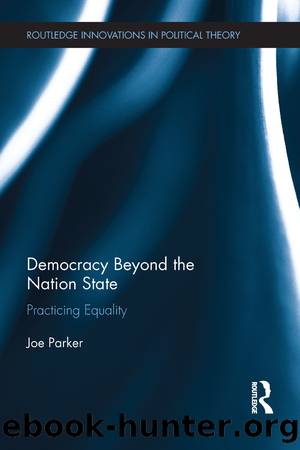Democracy Beyond the Nation State: Practicing Equality by Joe Parker

Author:Joe Parker [Parker, Joe]
Language: eng
Format: epub
Tags: Democracy, Political Ideologies, Social Science, Political Science, General
ISBN: 9781315303772
Google: 9jQqDwAAQBAJ
Publisher: Routledge
Published: 2017-06-26T08:06:42+00:00
Landless Workers Movement in Brazil
Our first exploration of egalitarian self-governance comes from Brazil, where a movement has emerged to reshape the politics of the poor. This movement is known as the Movement of Rural Workers without Land (Portuguese: Movimento dos Trabalhadores Rurais Sem Terra), commonly abbreviated as MST, and in English as the Landless Workers Movement, even though many of its constituents own land or have access to land.43 Rather than focusing on the narrow issue of land ownership, the founders and many participants in the movement chose the category of ârural workersâ (trabalhadores rurais) to emphasize not only land but also the need for agrarian reform, the expansion of the group of land owners beyond the wealthy, and social change that would address the desires of the rural poor, the urban poor, and the shrinking class of small-scale landowners.44 The MST takes as its forebears the Indigenous Guarani community, the runaway slave communities and Canudos settlement of the nineteenth century, the Contestado Wars of 1912â16, and the Peasant Leagues. Some of these predecessors found ways to provide land to the landless and to the Indigenous; they also shared duties and power through collective management and rejected state law to provide their own forms of autonomous justice in ways that were useful to the MST participants. The global smallholder farmersâ movement La Via Campesina, to be discussed in Chapter 5, was also an important model for MST.45
The movement began under the Brazilian military dictatorship in the late 1970s, with encampments in the south and an initial national congress in 1984. At first it was one of many movements supporting democratic elections, but after an electoral government took power, the MST realized that, despite victories in 1988 at constitutional reform for those who wanted access to land, democracy would take more than elections.46 Virtually all members of the MST movement come âfrom a world of abusive exploitation and extreme poverty, where, despite Brazilâs formal democracy, they had no influence whatsoever over key factors in their lives.â47 This combination of extreme poverty and the inability to determine major factors in their lives is one of the ways to identify a subaltern population.
MST emerged in the mid-1980s out of the specific politics of a long history of struggle of rural laborers. In Brazilian history, there have been several types of contractual forms of rural labor: rural wage earners, tenant farmers, sharecroppers, and specific jobs (such as cowboy or teamster). In Brazil, there is no collective noun for peasants like the Spanish term campesino or comparable to the term âpeasant,â a term used in the United States during the Cold War to refer to those who might threaten U.S. interests by spreading the Cuban Revolution.48 The state had institutionalized rural unions in 1944 to incorporate rural workers into state membership, and the state also formed the Agency for Agrarian Reform in 1962 and passed the Rural Workers Statute in 1963 to produce uniform legal codes and categories. Put in place shortly before the 1964
Download
This site does not store any files on its server. We only index and link to content provided by other sites. Please contact the content providers to delete copyright contents if any and email us, we'll remove relevant links or contents immediately.
| Anarchism | Communism & Socialism |
| Conservatism & Liberalism | Democracy |
| Fascism | Libertarianism |
| Nationalism | Radicalism |
| Utopian |
The Secret History by Donna Tartt(19096)
The Social Justice Warrior Handbook by Lisa De Pasquale(12191)
Thirteen Reasons Why by Jay Asher(8914)
This Is How You Lose Her by Junot Diaz(6890)
Weapons of Math Destruction by Cathy O'Neil(6282)
Zero to One by Peter Thiel(5804)
Beartown by Fredrik Backman(5759)
The Myth of the Strong Leader by Archie Brown(5510)
The Fire Next Time by James Baldwin(5450)
How Democracies Die by Steven Levitsky & Daniel Ziblatt(5221)
Promise Me, Dad by Joe Biden(5154)
Stone's Rules by Roger Stone(5088)
A Higher Loyalty: Truth, Lies, and Leadership by James Comey(4965)
100 Deadly Skills by Clint Emerson(4927)
Rise and Kill First by Ronen Bergman(4790)
Secrecy World by Jake Bernstein(4754)
The David Icke Guide to the Global Conspiracy (and how to end it) by David Icke(4720)
The Farm by Tom Rob Smith(4514)
The Doomsday Machine by Daniel Ellsberg(4491)
